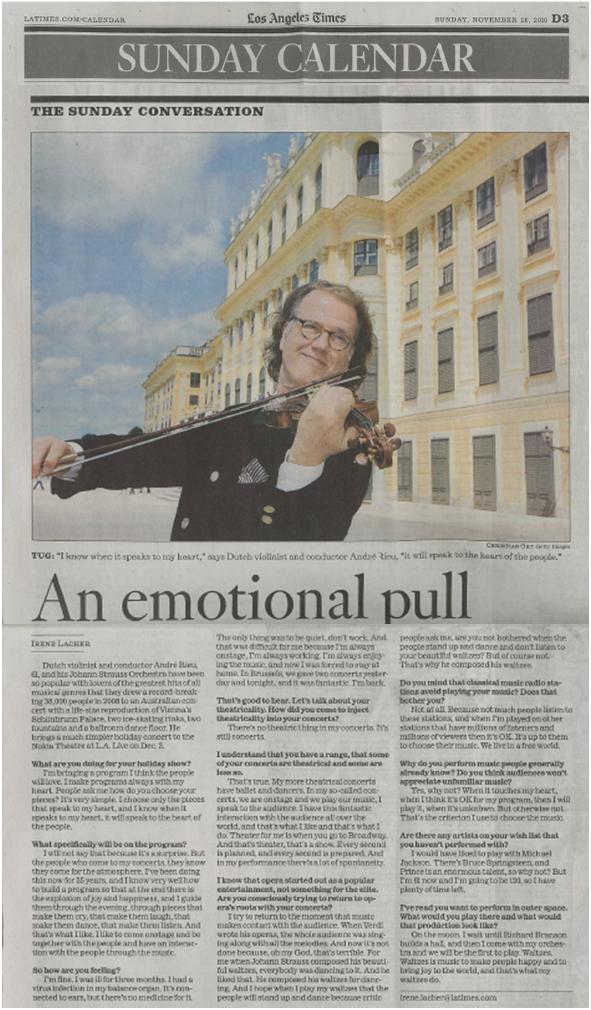The Sunday Conversation: With Andre Rieu
The Dutch conductor chooses performance pieces for his Johan Strauss Orchestra that move him. ‘I know when it speaks to my heart, it will speak to the heart of the people,’ he says.

Dutch violinist and conductor Andr Rieu, 61, and his Johann Strauss Orchestra have been so popular with lovers of the greatest hits of all musical genres that they drew a record-breaking 38,000 people in 2008 to an Australian concert with a life-size reproduction of Vienna’s Schnbrunn Palace, two ice-skating rinks, two fountains and a ballroom dance floor. He brings a much simpler holiday concert to the Nokia Theatre at L.A. Live on Dec. 3.
What are you doing for your holiday show?
I’m bringing a program I think the people will love. I make programs always with my heart. People ask me how do you choose your pieces? It’s very simple. I choose only the pieces that speak to my heart, and I know when it speaks to my heart, it will speak to the heart of the people.
What specifically will be on the program?
I will not say that because it’s a surprise. But the people who come to my concerts, they know they come for the atmosphere. I’ve been doing this now for 35 years, and I know very well how to build a program so that at the end there is the explosion of joy and happiness, and I guide them through the evening, through pieces that make them cry, that make them laugh, that make them dance, that make them listen. And that’s what I like. I like to come onstage and be together with the people and have an interaction with the people through the music.
So how are you feeling?
I’m fine. I was ill for three months. I had a virus infection in my balance organ. It’s connected to ears, but there’s no medicine for it. The only thing was to be quiet, don’t work. And that was difficult for me because I’m always onstage, I’m always working. I’m always enjoying the music, and now I was forced to stay at home. In Brussels, we gave two concerts yesterday and tonight, and it was fantastic. I’m back.
That’s good to hear. Let’s talk about your theatricality. How did you come to inject theatricality into your concerts?
There’s no theatric thing in my concerts. It’s still concerts.
I understand that you have a range, that some of your concerts are theatrical and some are less so.
That’s true. My more theatrical concerts have ballet and dancers. In my so-called concerts, we are onstage and we play our music, I speak to the audience. I have this fantastic interaction with the audience all over the world, and that’s what I like and that’s what I do. Theater for me is when you go to Broadway. And that’s theater, that’s a show. Every second is planned, and every second is prepared. And in my performance there’s a lot of spontaneity.
I know that opera started out as a popular entertainment, not something for the elite. Are you consciously trying to return to opera’s roots with your concerts?
I try to return to the moment that music makes contact with the audience. When Verdi wrote his operas, the whole audience was singing along with all the melodies. And now it’s not done because, oh my God, that’s terrible. For me when Johann Strauss composed his beautiful waltzes, everybody was dancing to it. And he liked that. He composed his waltzes for dancing. And I hope when I play my waltzes that the people will stand up and dance because critic people ask me, are you not bothered when the people stand up and dance and don’t listen to your beautiful waltzes? But of course not. That’s why he composed his waltzes.
Do you mind that classical music radio stations avoid playing your music? Does that bother you?
Not at all. Because not much people listen to these stations, and when I’m played on other stations that have millions of listeners and millions of viewers then it’s OK. It’s up to them to choose their music. We live in a free world.
Why do you perform music people generally already know? Do you think audiences won’t appreciate unfamiliar music?
Yes, why not? When it touches my heart, when I think it’s OK for my program, then I will play it, when it’s unknown. But otherwise not. That’s the criterion I use to choose the music.
Are there any artists on your wish list that you haven’t performed with?
I would have liked to play with Michael Jackson. There’s Bruce Springsteen, and Prince is an enormous talent, so why not? But I’m 61 now and I’m going to be 120, so I have plenty of time left.
I’ve read you want to perform in outer space. What would you play there and what would that production look like?
On the moon. I wait until Richard Branson builds a hall, and then I come with my orchestra and we will be the first to play. Waltzes. Waltzes is music to make people happy and to bring joy to the world, and that’s what my waltzes do.
